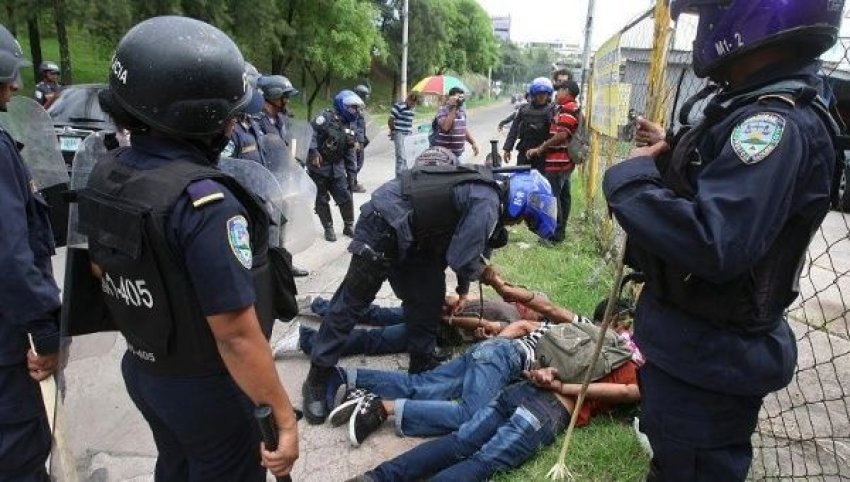
Allegations of human rights abuses have sky-rocketed in Honduras alongside a rise increase in militarisation in the violence-plagued Central American country.
Since a military coup overthrew of left-leaning elected president Manuel Zelaya in 2009, there has been a rising recent years has led to a flood of alleged abuses at the hands of soldiers. Allegations include arbitrary detentions, murder, torture and rape.
Militarisation spiked in Honduras after the coup in the name of increasing security and cracking down on violence in a nation dubbed the murder capital of the world.
President Juan Orlando Hernandez has pursued a policy of putting “a soldier on every corner”, following his National Party predecessor Porfirio Lobo had already ramped up militarisation in 2012.
Honduran authorities say militarisation is an effective strategy to crack down on drug gangs and violence crime. But analysts have pointed out that the drug war serves as a pretext for greater criminalisation of political dissent. The focus on gang violence obscures the widespread political violence, repression and impunity in Honduras.
Honduran soldiers were accused of at least nine murders, more than 20 incidents of torture, and about 30 illegal detentions between 2012 and last year, Reuters said.
The human rights group Rights Action documented 34 acts of violence and other crimes attributed to the Honduran military between 2010 and 2013 in northern Honduras' Aguan Valley region alone. The region is the site of an intense conflict between private large landowners and campesino movements struggling to defend their land and livelihood.
The Aguan Valley has been heavily militarised since the coup. As a result, violence and criminalisation of campesinos has dramatically increased in the region.
One of the Honduran government's security strategies involved creating a controversial hybrid military police force. Launched in 2013 with about 900 masked armed personnel who paroled city streets, the military police received widespread condemnation from human rights groups.
“The number of human rights violations by the military is rising, and the threat is greater and growing because military police operate with their faces covered and without visible identification, which fans impunity,” Juan Almendarez, director of a centre for the treatment of torture victims and their relatives told Reuters.
The military police force is set to expand by 40% this year. Hernandez, facing calls to resign amid popular outrage over corruption, has increased the country's defence budget by one-fifth.
What's more, a new inter-agency task force called FUSINA unites military, police, military police, prosecutors and other governmental officials under military control in a new network. Rights groups have raised alarm over this new extension of state and military power.
While the United Nations has urged Honduras to put a time limit on the military's security activities, the US has said it respects the government's move to use soldiers for police functions.
The US has also already ramped up its own security initiatives in the region by deploying 280 Marines to Central America, mostly stationed in Honduras.
Obama's pending US$1 billion Alliance for Prosperity plan is expected to pave the way for further militarisation in the name of “stabilisation” and exacerbate underlying social and economic inequalities in the region.
[Abridged from TeleSUR English (archived by Internet Archive.]